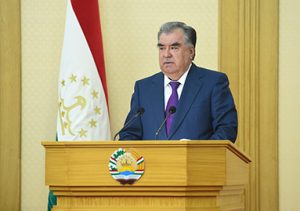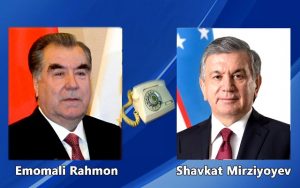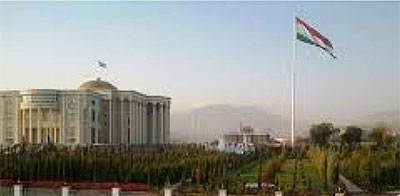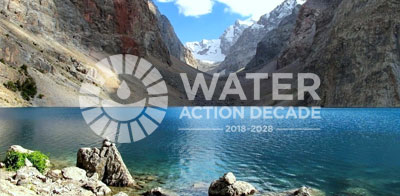Speech of the President of the Republic of Tajikistan H.E. Mr. Emomali Rahmon at the General Debate of the 75th Session of the United Nations General Assembly
Your Excellency Mr. President,
Excellency Mr. Secretary General,
Ladies and Gentlemen!
At the outset I with great delight extend heartfelt congratulations to Mr.Volkan Bozkir on his election as the President of the 75th Session of the United Nations General Assembly.
The current situation in the world has become complicated, volatile and turbulent at the background of growing geo-political, geo-economic competition and extension of modern threats and challenges, particularly a spread of coronavirus disease.
COVID-19 has initially been appeared as a healthcare crisis and been gradually turned into a justifiable global socio-economic and financial crisis.
The state of affairs at the current situation certainly requires our more active and coordinated actions.
We welcome the tireless efforts made by the UN Secretary General, United Nations specialized agencies, foundations and programmes to provide immediate and long-term assistance to member states in tackling the humanitarian and socio-economic repercussion of COVID-19 pandemic.
We applaud the commitment and praise the efforts of states to develop anti-COVID vaccine.
We very much hope that it will be accessible to all states and the vaccine producer-countries will initiate a supply of certain amount of vaccine as a humanitarian aid to cover the vulnerable groups from other countries, while prioritizing women, children and elderly people.
The COVID-19 outbreak has had a significant impact on the Republic of Tajikistan, which has become a matter of our deep concern.
With the view to preventing a spread of disease we today are exerting massive efforts to increase necessary volume of medication and medical equipment and to this end we for the time being are undertaking effectful measures in cooperation with the World Health Organization, countries and development partners.
Prestigious international organizations assess the consequences of coronavirus spread as an ongoing process, which would definitely adversely impact the global economy development.
This situation poses countless unprecedented challenges in front of Tajikistan’s development.
The coronavirus outbreak has led to recession in all areas of the national economy, including obstructing investment operations, such as foreign direct investment inflow, domestic and foreign trade, tourism and services, particularly transport sector.
Tajikistan as a mountainous and landlocked country does not possess sufficient amount of oil and gas resources.
In the meantime, we are dependent on import of fuel almost in hundred percent, as well as import of other goods and products, including food and pharmaceutical by eighty and ninety percent accordingly.
According to preliminary estimations, due to a negative impact of external economic factors, a total damage to Tajikistan’s economy this year would amount to more than 2 billion USD and most likely this number may increase in the future.
Taking into consideration an ongoing process of the pandemic impact, the Government of Tajikistan along with prevention of a spread of this infectious disease has been exerting efforts to undertake necessary measures aimed at ensuring consistent and sustainable operation of all socio-economic sectors of the country.
Mr. President,
It is crystal clear that advancement of constructive processes is possible only when lasting stability and overall safety are secured.
In a par with an unprecedented wave of COVID-19 nowadays expansion of scale and intensity of terrorism and extremism, armed conflicts and wars, transnational organized crime, including trafficking in narcotics and other modern threats and challenges remain alarming.
Terrorist and extremist groups pose tremendous challenge on national security, seriously jeopardizing stability of the countries and different regions.
Elimination of the menace of terrorism necessitates a clear perception of its motives and the root causes promoting terrorism, as well as common global approach towards the definition of terrorism.
Along with this, in our view, it is of particular importance to elaborate new and effective means to a common fight against terrorism, including by the means of the state-of-the-art technology, cooperation and coordination among relevant security authorities of the member states.
Bold and drastic measures commonly undertaken within the international law and avoidance of double standard policy are recognized as yet another important factors in tackling challenges.
Tajikistan is convinced that response to the growing threat of terrorism must be all-embracing and the United Nations should play a key coordinating role in this process.
Tajikistan being located in the frontline of addressing security threats and challenges has made and is determined to continue making an invaluable contribution to countering terrorism and extremism, fighting transnational organized crime, including tackling drug trafficking.
To this end, we maintain and foster productive cooperation with our partners and international organizations, in particular with the relevant UN agencies.
We have developed and at present are implementing shared initiatives which have already yielded noticeable results.
Currently our two National Strategies – the first on Counter-Terrorism and Extremism and the second on Counter-Narcotics Trafficking are in the final phase of an implementation in our country.
Commencement of cooperation with international organizations and regional partner institutions in elaboration of these two Strategy papers for a new period is a clear evidence of our success we have achieved in this direction.
We do believe it is necessary to comply with the rules and implement the provisions of the relevant generally accepted treaties and conventions.
In this regard, Tajikistan sustains fruitful cooperation with the relevant United Nations agencies and regional organizations, such as the Commonwealth of Independent States, the Shanghai Cooperation Organization and the Collective Security Treaty Organization.
We have also established productive bilateral cooperative relationships with our partner countries.
Success in joint concerted actions aiming at prevention and resolution of conflicts, exploration of peaceful ways of addressing crises and confrontations, first and foremost depends on the effective use of preventive diplomacy and mediation.
Accordingly, it is necessary to strengthen the preventive activity’s dimension of the UN, including to improve its Regional Center for Preventive Diplomacy for Central Asia.
Tajikistan which has experienced all horrors of the imposed civil war, values and well percepts the importance of an overwhelming protection of peace.
This is why Tajikistan hails the United Nations peacekeeping operations and strives to contribute to promote this process at extent possible.
Our police forces are involved in the UN peacekeeping operations in Darfur, South Sudan and the city of Abey of Sudan.
We are committed to further continue our cooperation in this area with the relevant United Nations bodies.
Given the experience our country gained in countering terrorism, extremism and illegal drug trafficking and with the view to introducing the Tajik peace experience we are determined to nominate for the first time Tajikistan’s candidacy for a non-permanent seat in the UN Security Council for 2028 – 2029.
We very much hope that Tajikistan’s initiative will be encouraged by the member-states and they will give their support to our candidacy.
Tajikistan shares almost 1,400 km. of border with Afghanistan.
We therefore give an utmost attention to the military, political and socio-economic situation in this close and extended neighboring country.
Escalation of alarming situation in this country urges the international community to undertake extra measures to coordinate actions in the fight against terrorism, coping with drug manufacturing and trafficking in narcotics, likewise deliver timely assistance to the Government and the people of Afghanistan.
As we stated time and again, the Afghan case has no military solution and Tajikistan indeed welcomes the peace-building negotiation processes and support any approach aimed at addressing political crisis in this country.
The destiny and the future of Afghanistan should be first and foremost led and owned by Afghan people and our belief is firm that stabilization of the situation in this country can be achieved only through Afghan-led, Afghan-owned and Afghan-controlled peacebuilding process.
Tajikistan this year is presiding over “The Heart of Asia – Istanbul Process” and during our presidency we will strive to increase a genuine efficiency of this platform.
To this day Tajikistan has contributed to the implementation of several joint regional projects on Afghanistan.
We built power transmission lines and constructed six transboundary bridges.
We stand ready to further advance cooperation which would help active involvement of Afghanistan into the regional integration processes and facilitate its socio-economic recovery.
Further implementation of projects on highway connectivity between the two countries’ and construction of power transmission lines, particularly CASA-1000 jointly with other countries of the region, professional training of Afghan specialists in different sectors are among the areas of cooperation that we sustain and are committed to promote.
Mr. President,
We have ten years left until the end of the 2030 Agenda and its Sustainable Development Goals.
The international community has made a significant progress in this direction over the past five years.
However, the economic and financial indicators of the countries and severe negative consequences of COVID-19 call into question a timely implementation of the Sustainable Development Goals, particularly in developing countries.
The repercussion of the COVID-19 will also negatively affect our country, which is one of the proactive members of the global community in an implementation of the 2030 Agenda.
I would like to recall that Tajikistan was one of the first countries to adopt its 2030 National Development Strategy in line with the 2030 Agenda.
Our country presented its National Voluntary Report back in 2017 and introduced its progress it has achieved towards the Sustainable Development Goals.
We are hopeful that the Decade of Action to deliver the Global Goals will help to seek ways of sustainable solutions to such pressing global challenges, as climate change, poverty, gender inequality and financing.
We should give an utmost importance to climate change challenges, which in this process pose serious hardships to all nations, including to Tajikistan.
Over the past sixty years, an average annual temperature in Tajikistan has increased by one degree.
It has resulted in increased number of days with heavy precipitations and intensity of natural hydro-meteorological phenomena, which have year after year been affecting all countries throughout the world.
Tajikistan with 93% of its territory covered by mountains, bears losses equal to hundreds of millions of dollars annually as a result of water-related disasters.
Such natural disasters often cause casualties.
The areas of glaciers located in our country which are essential for all Central Asia have been noticeably reduced over the recent decades.
One thousand out of thirteen thousand glaciers located in Tajikistan mountains have melted away so far.
This happens although up to sixty percent of Central Asia’s water resources is accumulated on the territory of Tajikistan.
This year, due to low precipitations in the winter we have seen a significant decline in water stock in the region’s rivers, which in turn led to low-water season during the irrigation and caused a severe drought.
This situation causes a negative impact on the quantity and a quality of safe drinking water, as well as water-related sectors, particularly agriculture and energy.
In connection with this circumstance, the countries of the region are concerned with the shifts in the hydrological cycle.
We in this connection would like to call on the United Nations and other international and regional organizations to support Tajikistan with the expedition of glaciers in Central Asia.
Tajikistan generates ninety nine percent of its electricity in hydro-electric power stations, that is from renewable ‘green’ energy sources.
Our country is among the less carbon dioxide emitters in the world.
In this context, I wish to once again offer the following proposals towards seeking the ways of addressing the climate change, which I had previously introduced in other international fora:
1. Encouragement of a widespread use of renewable energy sources, which would facilitate a friendly environment for the «green» economy development.
2. Comprehensive support by donor countries and international and regional financial institutions in an implementation of national strategies and programs for adaptation to climate change.
3. Reinforce regular monitoring of the generation of water resources, especially glaciers.
4. Strengthen international cooperation on protection of water resources and implementation of Tajikistan’s proposal to establish The International Glacier Preservation Fund.
5. Deliverance of comprehensive financial and technical assistance by developed countries and international organizations to developing and least developed countries to monitor and preserve glaciers and other sources of water.
We hope that our international partners will support further steps Tajikistan undertakes forward in these areas.
Mr. President,
The United Nations acknowledged Tajikistan as an initiator and champion country in advancing water agenda.
Our country is the author of majority of the United Nations’ initiatives and resolutions on water, including “The International Decade for Action “Water for Sustainable Development” 2018 – 2028”.
Owing to support of the UN member states we have been able to revive and strengthen the global water agenda over the past decades.
Tajikistan’s Resolution entitled “Comprehensive Mid-Term Review of the International Decade for Action “Water for Sustainable Development” 2018 – 2028 which had been adopted in 2018 had further enriched the global water agenda.
The Resolution along with other important goals and objectives, calls for convening the United Nations Conference on a Comprehensive Mid-Term Review of the International Decade for Action «Water for Sustainable Development» 2018 – 2028 in New York on March 2023.
This event is valued as an important initiative in terms of support towards an implementation of the Decade and conduct of the High-level Political Forum on Sustainable Development.
It is worth recalling that the last UN Conference on Water was held yet in 1977 in Mar de Plata, Argentina.
It means that the United Nations will host the Water Conference after 46 years.
We can confidently claim that the United Nations member states, UN specialized agencies and other organizations have been demonstrating a growing interest and utmost attention to the Decade for Action “Water for Sustainable Development” while some nations have already expressed their willingness to host regional preparatory meetings.
Regretfully, spread of COVID-19 affected their plans and most of the scheduled events have been postponed.
I hope that after the victory over the coronavirus pandemic, the stakeholder countries, along with Tajikistan, will be able to take full advantage of the opportunities and convene events they have scheduled.
In conclusion, I would like to draw the attention of all United Nations member states to the draft Resolution proposed by Tajikistan on the UN Conference for a Comprehensive Mid-Term Review of the Implementation of the International Decade for Action «Water for Sustainable Development, 2018 – 2028».
It is decided to review this Resolution at the UN General Assembly Session.
I would like to encourage all distinguished delegates to support our initiative, like they have been so generous in supporting our previous Resolutions.
Thank you for your kind attention!
























